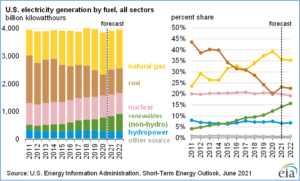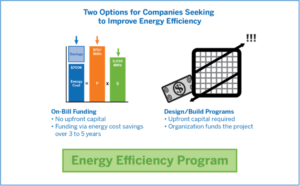Building sustainability goals into post-COVID energy strategies
As businesses emerge from the COVID-19 pandemic, they are proactively re-evaluating their energy strategies for two reasons:
- Curtailed commercial and industrial demand for energy during the pandemic, creating new volatility in fossil fuel markets. In 2020, demand for energy delivered to the four U.S. end-use sectors (residential, commercial, transportation, and industrial) was down 90% compared to 2019 levels.[1]
- A stronger focus on environmental, social, and corporate governance (ESG), along with increased government scrutiny and regulation for carbon emissions is driving the demand for renewables. According to the U.S. Energy Information Administration, the renewables share of U.S. generation will rise from 20% in 2020 to 21% in 2021 and 23% in 2022.[2]

Energy managers are recognizing that they need more than energy. They need a plan—a strategy that balances the pursuit of a sustainable future with the reality of attaining a strong bottom line.
“Sustainability doesn’t mean sacrificing profits or putting success on the back burner,” explains Natalie Chladek, Associate Product Manager at the Harvard Business School. “Instead, it has become a crucial element to any organization’s successful strategy. A business that doesn’t factor in sustainability risks is less successful in several measures, including profitability, growth, and employee retention.”[3]
But what goes into a sustainability plan? According to Raj Bazaj, Executive Director for Solution Sales at Constellation, it’s different for every organization. “Energy sustainability means being able to meet corporate efficiency goals through strategic solutions, including renewable energy options and energy efficiency initiatives. These reduce energy consumption—and thereby a company’s overall carbon footprint.”
The first step in creating a sustainability plan is to review and analyze energy use data. Energy analytics allow businesses to generate insights and inform strategies that can lead to both cost savings and sustainability. For many organizations, a sustainable energy strategy contains two key components:
- Energy Efficiency:using a lower quantity of energy to do the same amount of work can help reduce greenhouse gas emissions and therefore safeguard the environment. Energy efficiency is considered the first step when putting together a sustainability plan.
- Renewable Energy: energy produced from sources that do not deplete or can be replenished within a human’s lifetime (compared with non-renewable sources like fossil fuels).
The best plans consider both renewable energy sources and efficiency options in coordination with usage habits and budget considerations. Constellation has the expertise, products, and technologies to help energy managers every step of the way. Here are just a few ways Constellation can help:
Understanding usage
Knowledge is power. The more energy managers know about their energy usage data and trends, the better they’re equipped to meet savings, risk management, and strategic goals. Through Constellation’s Pear.ai platform one can easily understand the usage trends and see abnormalities when they occur. The continuous monitoring of data and analysis help identify the best areas for implementing energy optimization projects within a facility or between different facilities. This proactive approach helps drive an efficiency strategy that not only lowers carbon usage but also reduce one’s energy bill.
“Increasingly, with a focus on sustainability, our customers want to better understand and control their energy portfolio,” said Bazaj. “The Pear.ai platform effectively and efficiently meets that demand.”
In Middletown, CT, Wesleyan University is already experiencing the benefits of the Pear.ai platform’s functionality. The university operates a multi-faceted utility footprint that includes power, gas, heating oil, propane, solar, and cogeneration powering academic buildings as well as student and faculty housing.
“I went from literally mountains of paper and a grueling 20 hours per month of data entry and accounts payable processing to having the university’s entire energy footprint essentially at my fingertips,” said Jeff Murphy, facilities business manager at Wesleyan.
Efficiency Made Easy
Using less energy can help businesses work toward their sustainability goals. The best news is that efficiency upgrades don’t require prohibitive upfront costs. In fact, Constellation offers efficiency solutions that don’t require upfront costs at all.
Constellation’s Efficiency Made Easy program enables customers to pay for energy conservation measures through monthly charges that appear on their business’ power or natural gas supply bill. Meanwhile, energy managers will realize cost savings by reducing consumption and an improved load profile, which will positively impact future energy costs and environmental goals.
Many companies find on-bill funding as a means to achieve corporate compliance with regulatory requirements, meet established sustainability goals, improve electricity load profile, realize energy cost savings, increase asset valuation, and reduce operation and maintenance (O&M) costs.
In addition to on-bill funding, Constellation can also work with organizations to create customized design/build upgrade solutions if that arrangement is a better fit.

Renewable energy options
Constellation provides renewable energy options for both short- and long-term sustainability goals. These options can be accessed independently or built into an overall sustainability plan leveraging the full range of Constellation expertise and resources.
- Solar: Solar energy options are available through Constellation’s Efficiency Made Easy program. The cost of photovotaic (P/V) systems can be included in the regular Constellation power bill.
- Constellation Offsite Renewables (CORe): CORe is designed to provide businesses access to offsite renewable energy projects through the simplicity of a retail power contract. Location-specific renewable energy purchases can be combined with renewable energy certificates (RECs) to make a strong sustainability statement. For an even more impactful renewable option, CORe+ supports the development of new build renewable assets through the same retail contract.
- Renewable Energy Certificates (RECs): Through the purchase of RECs, businesses can support their sustainability goals by matching their energy usage with renewable energy delivered to the grid. Each REC represents the environmental attributes associated with one megawatt-hour of renewable generation.
- Emission-Free Energy Certificates (EFECs): Carbon-Free Electricity Plans from Constellation will be fulfilled through EFECs that are created to represent generating sources that do not directly emit greenhouse gases from combustion.
Sustainability: It starts with a plan
Renewable energy products, customized analytics, and creative cost solutions are all in place. But the first thing every organization needs is a comprehensive plan that will helps them set achievable sustainability goals, maximize resources, and reach those objectives. Constellation can break it all down and provide the turnkey service that makes it easy. To learn more, check out the Supplier to Strategist blog series and subscribe to Constellation’s array of resources here.
To learn more about specialized energy for your business, visit your association’s site.
[1] U.S. Energy Information Administration (EIA). – Consumption – Energy consumption fell faster than gross domestic product in 2020, and the pace at which both will return to 2019 levels remains uncertain – U.S. Energy Information Administration (EIA). (n.d.). https://www.eia.gov/outlooks/aeo/consumption/sub-topic-01.php.
[2] U.S. Energy Information Administration – EIA – Independent Statistics and Analysis. Short-Term Energy Outlook – U.S. Energy Information Administration (EIA). (n.d.). https://www.eia.gov/outlooks/steo/report/electricity.php.
[3] The Importance of Sustainability in Business: HBS Online. Business Insights – Blog. (2019, November 6). https://online.hbs.edu/blog/post/business-sustainability-strategies.


